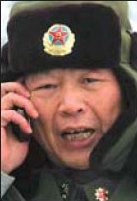PLA officer driving force behind snow relief effort
Updated: 2008-02-19 07:04
CHENZHOU, Hunan: Twenty days of snow and icy rain on the 87-km Chenzhou section of the Beijing-Zhuhai expressway paralyzed traffic, leaving tens of thousands of passengers stranded.
|
|
And no one knew the gravity of the situation better than Wei Yongjing, the 53-year-old commissar of the Chenzhou military sub-region in Hunan province who led the disaster-relief team on the section.
Extreme weather made the section, noted for its serried ridges and bridges, frozen with an average of 30 cm of ice, blocking the country's south-north artery and trapping more than 8,000 vehicles and 50,000 passengers.
From January 25, Wei spent almost all his time directing traffic, de-icing, unblocking expressway exits and distributing necessities.
"I drove him for 3,000 km in 10 days on the temporary emergency route made for disaster relief along the 87-km section," said his driver Wu Jianjun.
And sometimes, the energetic Wei would jump out of the car and join the soldiers in de-icing.
"We were all tired and desperate, but seeing a man my father's age sparing no effort in the battle, I really didn't have any reason to slack off," said Zhang Miao, a soldier.
Wei was to prove an inspiration "as people were tired and irritable, and needed someone to give them hope."
However, he said he also felt despair sometimes.
Although Wei and his team succeeded in clearing ice off the road, constant snowfall froze it again four more times.
"I felt desperate, and didn't know when it would end," Wei recalled.
"But the looks of helpless passengers and drivers motivated me. I could not give up as the Spring Festival was approaching."
Emergencies added to the chaos. On the afternoon of January 29, the ceiling of a gas station near Wei's command headquarters collapsed under the weight of snow, burying seven vehicles and six people.
Wei managed to remain cool - he stopped people rushing to rescue those buried beneath the rubble before calling the fire department in case of a gas explosion. Three were injured in the incident.
Bi Hua, vice-mayor of the city who worked with Wei, said: "With his rich experience in disaster relief work, he handled emergencies cool-headedly."
The battle was not only physical, but also psychological.
"After more than 10 days, I bet every normal man would lose his temper," Wei said. "The drivers and passengers sometimes threw curses at us. Some people would come and ask for more food. All these require patience."
With the help of armored vehicles breaking ice, Wei's team finally managed to make the section fully navigable on Feb 3, reopening the south-north traffic line after nine days.
It is not the first time that Wei has moved people with his perseverance. Nicknamed "bare-foot lieutenant", the man is a household name in the city as he always worked without shoes while fighting the annual flooding.
While many people admire Wei, he has his own idols.
"Sometimes I can't help crying when thinking about my comrades-in-arms. While they worked with me, their own families were suffering from power shortages and cold, with some of their family members in hospitals. But they never said no to the tasks assigned," Wei said.
Two weeks after the Spring Festival, Wei's eyes are still bloodshot eyes and lips parched. He has had dinner with his wife only once in the past one month, spending all his time restoring public utilities and power facilities.
Wei said he feels most sorry for his wife - they have mostly lived apart in their 27 years of marriage.
Yet Wei's wife Sun Yizhi, who has been living in Changsha, capital of Hunan, said she does not feel the same way.
"I support his job all the time," Sun said.
|
|
|
||
|
||
|
|
|
|
